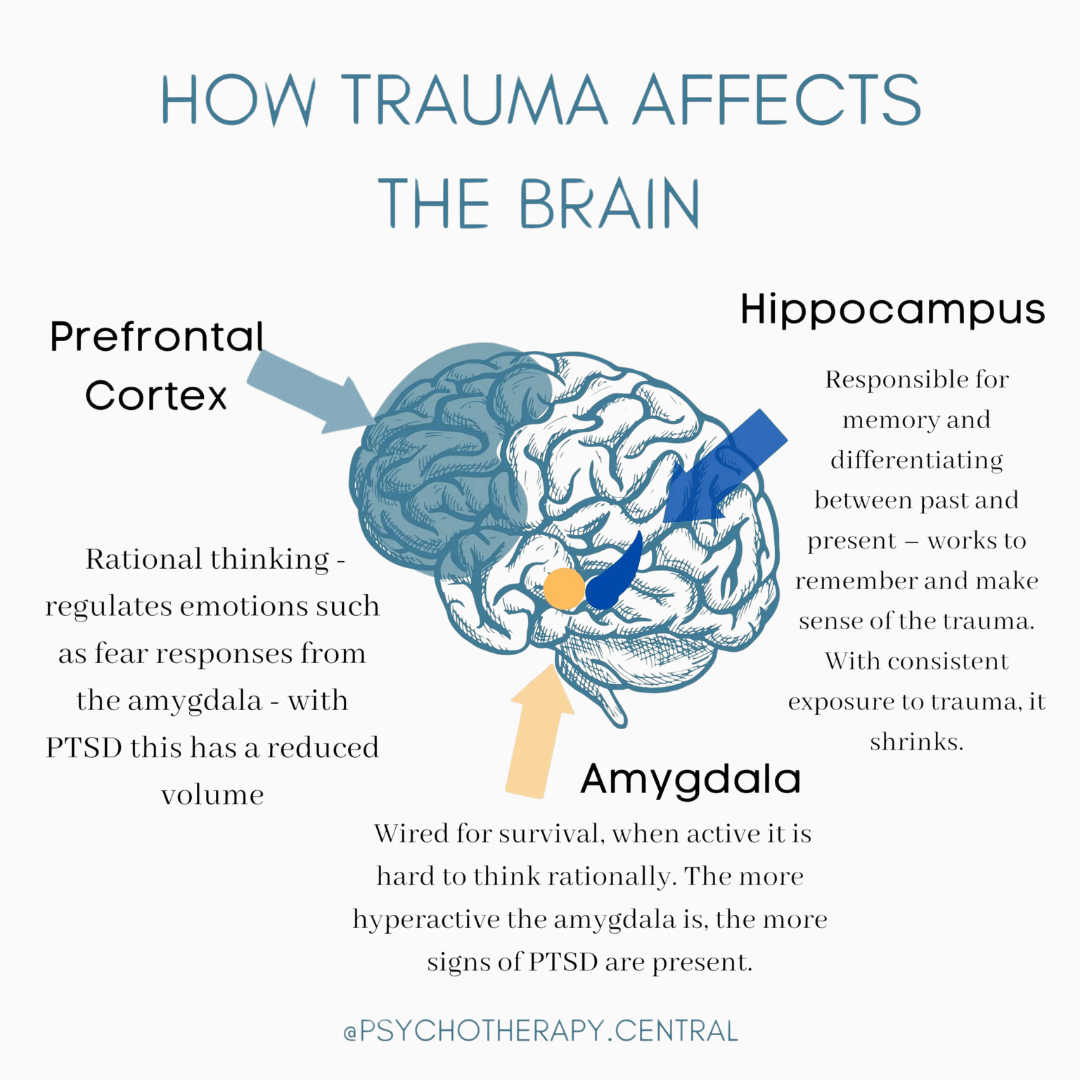Understanding the Impact of Trauma on the Brain, Body, and Emotions
Trauma doesn’t just affect how we feel emotionally—it has a profound impact on how our brain and body function as well. Whether the trauma comes from childhood experiences, abuse, or life-threatening events, its effects can continue long after the incident itself, influencing nearly every part of a person’s life. In this blog, we’ll explore how trauma alters the brain, affects the body, and disrupts emotional well-being, as well as how trauma-informed therapy can help individuals recover and heal.
Effects of Trauma on the Brain
Amygdala (Fear Center) The amygdala is the brain’s primary fear-processing center, and trauma causes it to become overactive. This heightened response results in what’s known as hypervigilance—the constant feeling of being on edge or under threat. Survivors of trauma may find themselves startled easily or fearful of everyday situations, even when there is no immediate danger. This can make normal, daily interactions feel overwhelming and exhausting.
Prefrontal Cortex (Decision-Making and Rational Thought) Trauma can suppress the prefrontal cortex, the part of the brain responsible for reasoning, decision-making, and emotional regulation. With this area affected, trauma survivors may have difficulty focusing, feel overwhelmed by minor stressors, or act impulsively in emotional situations. This impaired function leads to challenges in managing stress and making sound decisions, as the brain struggles to calm itself.
Hippocampus (Memory and Learning) The hippocampus, which plays a key role in memory formation and learning, is also impacted by trauma. Some trauma survivors may experience memory fragmentation, where they struggle to remember specific details of the event, or they may feel as though they’re reliving the trauma over and over again. In these cases, fragmented memories can be triggered by sounds, smells, or other cues, often without conscious awareness of what’s happening.
Effects of Trauma on the Body
Chronic Stress Response Trauma triggers the body’s sympathetic nervous system, putting it in a perpetual state of "fight-or-flight." When the body stays in this state long-term, it can lead to chronic stress, resulting in physical issues such as high blood pressure, digestive problems, and a weakened immune system. Many trauma survivors feel constantly tense or exhausted, as if their body is always on high alert.
Somatic Symptoms Physical manifestations of trauma are common and can include muscle tension, headaches, gastrointestinal issues, or chronic pain. Some survivors may also experience dissociation, where they feel numb or disconnected from their body. Conversely, others may feel hypersensitive to physical sensations. This disconnection from the body serves as a coping mechanism, but it also makes it difficult to stay grounded in the present.
Dissociation from the Body Dissociation is a common response to overwhelming trauma, where survivors feel detached from their body or surroundings. While this can temporarily protect against emotional pain, it also makes it harder for individuals to process emotions or remain present. This creates challenges for trauma survivors, as it complicates their ability to fully engage in the healing process.
Effects of Trauma on Emotions
Emotional Dysregulation Intense and unpredictable emotions—such as fear, anger, sadness, or guilt—are frequent in trauma survivors. These emotions can often seem disproportionate to the current situation. Some survivors may also avoid emotions altogether, numbing themselves in an effort to protect against re-experiencing the pain of the trauma.
Hyperarousal and Hypervigilance After trauma, survivors often feel like they must be on constant alert for potential threats. This heightened state of awareness can interfere with sleep, concentration, and trust in others. The individual is often unable to relax, stuck in a loop of emotional hyperawareness, which keeps them from fully engaging with life in a healthy way.
Shame and Guilt Feelings of shame and guilt are common for trauma survivors, even when they had no control over the traumatic event. These emotions contribute to a damaged sense of self-worth, leaving survivors feeling broken or different from others. Shame and guilt create additional barriers to healing, as they often lead to self-isolation and depression.
Trauma-Informed Therapy: A Path to Healing
Trauma-informed therapy offers a compassionate, safe space for survivors to begin their healing journey. By understanding the intricate ways trauma affects the brain, body, and emotions, therapists can work alongside survivors to help them regain control of their lives. This therapeutic approach prioritizes safety, empowerment, and collaboration, allowing survivors to process their experiences in their own time and build a future based on resilience and self-worth.
In summary, the effects of trauma ripple through every part of a person’s being. However, with the right support and trauma-informed care, individuals can heal from their past and move towards a healthier, more balanced life.
Seeking Trauma Therapy Today
If you or someone you know is dealing with the impact of trauma, seeking trauma-focused treatment can be a crucial step towards healing. This specialized approach helps individuals work through the emotional, physical, and psychological complexities of trauma, guiding them to regain control and rebuild their lives. Trauma treatment empowers survivors by offering a safe, supportive space to process their experiences, helping them feel heard and understood. Don’t wait to begin the healing process—reach out to a trauma-focused therapist today and take the first step toward reclaiming your sense of self and peace.

